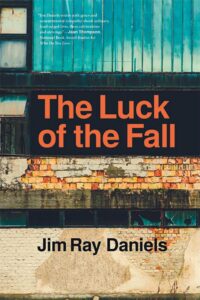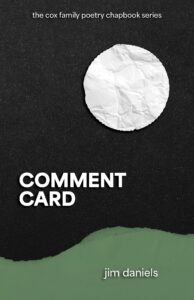
A Conversation with Jim Daniels
Lowestoft Chronicle interview by Nicholas Litchfield (February 2024)

Author, editor, and scriptwriter Jim Daniels, a man with forty-two books and four independent films to his name, has had a long and distinguished literary career. His many awards include a Devine Fellowship in poetry, selected by Pulitzer Prize winner Galway Kinnell; the Wisconsin/Brittingham Prize for Poetry, judged by Pulitzer Prize winner C. K. Williams; two fellowships from the National Endowment for the Arts, and two from the Pennsylvania Council on the Arts. His poems—some anthologized in the Pushcart Prize and Best American Poetry, some recited on A Prairie Home Companion and NPR’s All Things Considered—have been featured on Garrison Keillor’s The Writer’s Almanac, in Billy Collins’ Poetry 180 anthologies, and Ted Kooser’s national newspaper column “American Life in Poetry.” One of his poems was even reproduced on the roof of a race car.
In this exclusive interview with Lowestoft Chronicle, Daniels discusses his most recent fiction collection, his new chapbook, and the remarkable attention his first full-length poetry collection drew.
Lowestoft Chronicle (LC): The Luck of the Fall, published by Michigan State University Press last year, is a moving collection where, to put it broadly, the past plays a principal role in characters’ thoughts, outlooks, and impulses. The voices are varied, and the tone and style of the writing differ throughout. You also cover all sorts of heavy subjects, including addiction and recovery, grief, and mental illness. How did this collection take shape? What’s the unifying theme? And did you write these thirteen stories with the intention of publishing them together in one volume?

JD: Thanks. Oh, yes, the first sentences are very important for me. As important as the title, often. Particularly coming from my background as a poet, I always try to create an immediacy with the opening, to get into it as quickly as possible without too much backstory, making the story feel top-heavy.
You’re certainly right in noticing that the past plays a big role in many of the stories. I feel like “The Heart-Attack Bear” is dominated by the past, for the main character, at least, so my challenge there was to show a character living in the past while also showing how it affects his present life to achieve a balance, to try to avoid the story itself being nostalgic for the past when the main character himself is nostalgic.
While I didn’t write “The Luck of the Fall” with the North American Review in mind, I have been fortunate enough to find them receptive to both my stories and poems over the years. I really enjoy reading the magazine, and the title story seemed like a good fit. It was the first place I submitted it, so I was very happy they took it. One of the things that has sustained me over the years is the support for certain journals that have stayed with me over the decades.
LC: You gave an interview for Superstition Review many years ago (I think it may have been in 2008), and one of the questions concerned how fatherhood affects your writing. That question was related to a poetry collection, but I think the essence of it is pertinent to this collection, too. A story like “The Spirit Award,” where a boy yearns for love and validation from his somewhat aloof and detached father, provokes scrutiny of one’s own parenting skills. What was the motivation behind this story? How challenging is it to adopt the perspective of an adolescent and seem authentic?
JD: I think that story came from a number of places. First, as a parent, I witnessed the political aspect of youth sports, the fathers in particular taking it way too seriously. But part of it involves my relationship with my own father. He was working a lot of overtime when I was young and playing sports, and he missed most of my games—in fact, whole seasons, and that opportunity created some emotional distance between us. He himself was a star athlete in high school, and I think it saddens us both a little that we missed a potential connection back when I was a kid. I have to admit, I wasn’t much of an athlete, like the main character in the story. In my last season of high school basketball, I scored one point the entire year. Enough said.
LC: Regarding your short fiction, you’ve filled seven volumes (including one formed from flash fiction pieces), and two-time Oscar-nominated director/screenwriter John Sayles extolled praise on characters in Trigger Man, one of those collections. You’ve even published four screenplays, each of which have been independent films. Have you written any novels, and are there other mediums you’d like to explore (perhaps stage plays or radio dramas)?
JD: I really started out as a poet, and I continue to write a lot of poetry, so, for me, a short story can seem long. I’ve written some pretty long stories, but nothing approaching a novel—though I read novels all the time. I have been writing more essays lately, and will have a collection of those, An Ignorance of Trees, forthcoming in 2025 from Cornerstone Press. I did write a couple of one-act plays that got produced here and there by small theater companies. I also really enjoyed the process of collaboration on the low-budget films, and I’ve worked with a photographer, Charlee Brodsky, on two books that combine her photos and my poems, so I would like to find more opportunities to work with artists in other fields. John Sayles is one of my heroes—both through his fiction and his films, he has maintained his individuality and independence as an artist and has never been afraid to try new things.
LC: When it comes to poems, my assumption has always been that, by and large, chapbooks and volumes of poetry tend to go unnoticed by leading publications. But this doesn’t seem to be the case with your work. Careful appraisals of your verse feature in venues like the Village Voice, the Wall Street Journal, and multiple times in the New York Times Book Review. Were you surprised by the attention and accolades your first full-length collection, Places/Everyone, received? What impact did winning the inaugural Brittingham Prize in Poetry have on your writing?
JD: You are certainly correct in that assumption. This is particularly true of chapbooks, but I’ve always liked the intensity and thematic unity you can create in the shorter form, and I also like how attractive many chapbooks are—I’ve had a few gorgeous letterpress collections over the years. I was very lucky that Places/Everyone got quite a bit of attention and helped launch my career. I was definitely surprised! I was also lucky that the Brittingham Prize has continued over the years and gained in stature, with many notable poets being selected. It’ll be going on forty years next year. At this point in my writing life, I am happy to continue to find an audience, however small, for my writing.
LC: “Jim Daniels is a kind of Bruce Springsteen of the poetry world. Or, in keeping with his Michigan roots, perhaps a Bob Seger,” wrote Roger Gilles of the daily newspaper The Grand Rapids Press. “The result is every bit as powerful as anything Springsteen or Seger have produced.” It’s always great to receive positive endorsements, but have you ever felt pressure when putting together a collection, such as a fear of not living up to expectations?
JD: Well, that’s pretty hyperbolic, but I’ll take the praise. One of my recent books was RESPECT: The Poetry of Detroit Music, an anthology of poetry and lyrics about the city. Music has been one of the great exports from Detroit, along with, of course, cars, so Springsteen and Seger, particularly in terms of their songs that capture working-class life, have been an influence on me.
I’m a fairly obsessive writer, so I’m always working on something, so I produce a lot. I think, however, particularly with poetry, my expectations for recognition tend to be pretty low.

LC: Your newest collection, Comment Card, was published by Carnegie Mellon University Press a few days ago. It’s your thirty-second collection. How does this chapbook differ from prior work, and what can your readers expect?
JD: Particularly for a chapbook, this has less of a tight focus. I think this is my first collection that does not have the word “Detroit” in it, and I think that’s a significant departure readers might notice. Family continues to play a significant role in this collection, though the perspective comes from an older person with grown children of his own.
I don’t think any writer wants to get pigeonholed, and I’m no exception. I want to continue to grow and try new things—to surprise myself and, hopefully, my readers as well.
About the Author
Jim Daniels’ first nonfiction book, The Abridged Book of Water, is forthcoming from Cornerstone Press. His recent book of fiction, The Luck of the Fall, was published by Michigan State University Press in July 2023. Recent poetry books include The Human Engine at Dawn from Wolfson Press and Gun/Shy from Wayne State University Press. His new chapbook, Comment Card, from Carnegie Mellon University Press, was published in February 2024. A native of Detroit, he currently lives in Pittsburgh and teaches in the Alma College low-residency MFA program.
About the Interviewer
Nicholas Litchfield is the founding editor of Lowestoft Chronicle. He has worked in various countries as a journalist, researcher, librarian, and grants writer and resides in western New York. Formerly a book critic for the Lancashire Post, syndicated to twenty-five newspapers across the U.K., he now writes for Publishers Weekly. He can be found at nicholaslitchfield.com.
